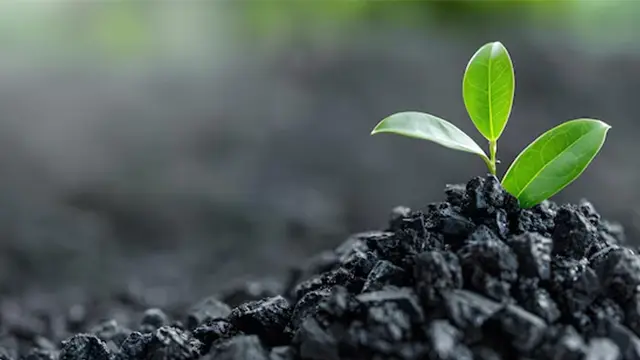
09 Jul Unlocking the Power of Explorius Biochar: A Sustainable Solution for Soil and Climate
What is Biochar?
Biochar is a form of charcoal produced by heating organic material in a low-oxygen environment, a process known as pyrolysis. This method transforms biomass into a stable form of carbon that can be used to enhance soil health, sequester carbon, and reduce greenhouse gas emissions.
The Biochar Production Process
The production of biochar involves three main stages:
1. Organic Material: The process begins with organic materials such as wood, crop residues, or manure.
2. Pyrolysis: These materials are then subjected to high temperatures in the absence of oxygen, resulting in the formation of biochar.
3. Biochar: The final product is a carbon-rich solid that can be applied to soil.
High-Temperature Biochar Production
When biochar is produced at higher temperatures the process and properties of the resulting biochar can differ significantly:
1. Enhanced Stability: Biochar produced at higher tempratures tends to be more stable and resistant to decomposition, making it even more effective for long-term carbon sequestration.
2. Increased Surface Area: Higher temperatures increase the surface area and porosity of biochar, which can enhance its ability to retain water and nutrients.
3. Reduced Volatile Compounds: The higher temperature reduces the presence of volatile organic compounds, resulting in a purer form of biochar.
Benefits of Biochar
Biochar offers numerous environmental and agricultural benefits:
1. Improved Soil Health: Biochar enhances soil fertility by improving water retention, nutrient availability, and microbial activity. It also helps reduce soil acidity and improve soil structure.
2. Carbon Sequestration: Biochar is highly stable and can persist in soil for hundreds to thousands of years, making it an effective way to sequester carbon and mitigate climate change.
3. Reduced Greenhouse Gas Emissions: By decreasing methane and nitrous oxide emissions from soil, biochar helps reduce the overall greenhouse gas emissions.
Applications of Biochar
Biochar can be used in various applications, including:
• Agriculture: Enhancing soil health and crop productivity.
• Horticulture: Improving garden soil and plant growth.
• Environmental Remediation: Restoring degraded lands and reducing pollution.
Conclusion
Explorius Biochar is a powerful tool for sustainable agriculture and climate change mitigation. By improving soil health and sequestering carbon, biochar offers a promising solution for a more sustainable future.





Sorry, the comment form is closed at this time.